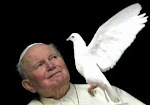What follows is a dictionary definition of "abortion" and "contraception". The dictionary, The Modern Catholic Dictionary authored by Rev. John A. Hardon, S.J. Among his collaborators were seven priests and three nuns. It carries the Imprimi Potest, Nihil Obstat and Imprimatur. Father Hardon has among other degrees a doctorate in theology from the Gregorian University in Rome. He was a professor in the Institute for Advanced Studies in Catholic Doctrine at St. John's University, New York.
ABORTION
Hundreds of ecclesiastical documents from the first century through the present testify to the same moral doctrine, with such nuances as time, place, and circumstances indicated. The Second Vatican Council declared: "Life must be protected with the utmost care from the moment of conception," so that "abortion" and infanticide are abominable crimes" (Constitution on the Church in the modern world, IV, 51). Pope Paul VI confirmed this teaching in 1974, "Respect for human life," he wrote, "is called for from the time that the process of generation begins. From the time that the ovum is fertilized, a life is begun which is neither that of the father nor of the mother, it is rather the life of a new human being with its own growth. It would never be made human if it were not human already." Consequently, "divine law and natural reason excludes all right to the direct killing of an innocent human being" (Declaration on procured abortion, III, 12) ( Etym. Latin abortivus, born prematurely, abortive; from aboriri, to miscarry.)
CONTRACEPTION
Deliberate interference with marital intercourse in order to prevent conception. It is the performance of the marriage act with the positive frustration of conception. Also called conjugal onanism, from the sin of Onan, referred to in the Bible (Genesis 38:8 -10); Neo-Malthusianism from the name of the English sociologist Malthus (1766-1834); it is popularly termed birth control, where those concerned with high birthrates have come to equate contraception with population control.
The Catholic Church has forbidden contraception from earliest times, and the number of papal statements dealing with the subject indicate the Church's constant tradition. In modern times the most significant document was Humanae Vitae in 1968 by Paul VI. After referring to the long history of the Church's teaching, he declared that the "direct interruption of the generative process already begun, " even though done for therapeutic reasons , is to be absolutely excluded as a licit means of regulating birth." Equally to be excluded is direct sterilization for contraceptive reasons. "Similarly excluded is every action that, in anticipation of the conjugal act, or in its accomplishment, or in the development of its natural consequences, proposes, whether as an end or as a means, to render procreation impossible" (Humanae Vitae II, 14).
Few aspects of Christian morality in modern times have given rise to more difficulties of conscience than the Catholic doctrine on contraception. This was reflected in Paul's admission, shortly after Humanae Vitae: "How many times we have trenbled before the alternatives of an easy condescension to current opinions."
One of the results of the Church's teaching on contraception has been to emphasize her right to teach the faithful, even to binding them gravely in conscience, in matters that pertain to the natural law. Yet the basic motivation offered to married people to live up to this difficult teaching is highly supernatural., namely the prospect of loving one another in such a way that they will share the fruits of their affection with another person whom their mutual love will bring into being.
CONTRACEPTIVE STERILIZATION
Depriving the body of its generative powers in order to prevent the conception of fetal development of undesired offspring, for the satisfaction of a persons wishes and/or the relief of an economic or social need. Its morality falls under the same category as contraception. It is forbidden by the natural law.
Subscribe to:
Post Comments (Atom)




No comments:
Post a Comment